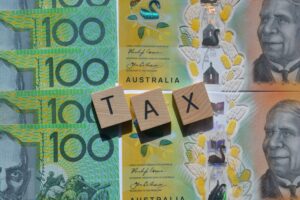How U.S. Political shifts could impact the ASX: A Market guide
![]() Ujjwal Maheshwari, October 18, 2024
Ujjwal Maheshwari, October 18, 2024
The political conflicts can steer the economy of the countries in the world. Certain factors will let off a chain of events that will ultimately change the course of action for the countries that are both involved and uninvolved in those said political conflicts. The United States, as one of the world’s largest economies, holds a significant influence over the global financial ecosystem. Political shifts in the US including changes in the administration, governmental policies, and major economic decisions have the potential to cause repercussions through the international stock markets, which also include the Australian Stock Exchange (ASX).
Some major political conflicts in the US have some serious global consequences. By understanding these dynamics, investors can make informed investment decisions and be better prepared for these political altercations.
Why U.S. Political Shifts Matter to the ASX?
When considering the trade and economic relations between the U.S. and Australia, their relationship is stronger than ever. Therefore, any tiny political shift in the U.S. has the potential to influence the Australian economy and the ASX. The U.S. is Australia’s third-largest trading partner. The countries are involved in a two-way trade agreement, the Australia-United States Free Trade Agreement (AUSFTA) which significantly contributes to each other’s economies. Thus, changes in U.S. policies can affect certain sectors such as technology, energy, and even mining which are key players on the ASX.
Here’s a brief about the relationship between the U.S. and Australia in trade and investment:
- Total Trade – In 2022, the trade between the U.S. and Australia reached a whopping $77 billion. The U.S. reportedly exported around $52 billion worth of goods and services to Australia. They also imported commodities worth $25 billion.
- Trade surplus – The U.S. had a trade surplus of $27 billion with Australia in 2022. This essentially means that the country of the U.S. has exported more than it imported.
- Goods trade – The U.S. exported goods worth $33.7 billion to Australia in 2023, which was calculated to be 10.2% more than in 2022. The goods imported from Australia were around $16 billion in 2023. It is a slighter fall when compared to 2022. But the U.S. goods trade surplus with Australia stands strong because the surplus grew to $18 billion in 2023.
- Services trade – The U.S. exported $27 billion worth of services to Australia in 2022. This is a significant rise of 30.6% from 2021.
- Investment – During 2022, U.S. companies invested a sum of $174 billion in Australia. This concentration of investments spanned various sectors including nonbank holding companies, mining, and manufacturing.
How U.S. Policies Influence Global Markets?
When the U.S. government makes changes to their economic trade agreements, taxes, or certain regulations, it tends to affect the global supply chain, and trade flows between countries and causes wavering investor faith in the market.
- A U.S. administration increasing tariffs (taxes imposed on the import or export of goods and services) could lead to higher prices on imported goods. This can affect Australian exports thereby influencing its manufacturing sectors.
- Monetary policy changes, such as interest rate adjustments by the Federal Reserve, have the potential to affect global capital costs. These changes can have a pivotal impact on the investment decisions of the ASX.
ASX Stocks Affected by U.S. Political Shifts
Technology
The U.S. houses some of the major tech companies that currently dominate the global technological market. ASX-listed tech companies like WiseTech Global (ASX: WTC) and Xero (ASX: XRO) are affected by U.S. regulations on digital services.
Under the U.S. administration’s focus on ongoing competition with China, constraints on Chinese tech firms can affect the supply chain and demand for products from Australian tech companies.
Mining and Resources
Australia’s mining and resources sector is a foundation of the ASX. When U.S. policy shifts towards energy and climate change, it can have consequential effects on this sector. Major players like BHP Group (ASX: BHP), Rio Tinto (ASX: RIO), and Fortescue Metals Group (ASX: FMG), which primarily focus on iron ore, coal, and other natural resources, rely heavily on stable demand and pricing decisions from international markets
For instance, a U.S. push towards renewable energy could drive up demand for key minerals like lithium and copper thereby boosting Australian mining companies.
Energy
Considering the global energy market, the political stance of the U.S. on matters like fossil fuels and renewable energy can have a significant impact. This will affect ASX-listed energy stocks, particularly Woodside Energy Group (ASX: WDS) and Santos (ASX: STO). There is often a need for countries to shift toward sustainable energy reserves, which impacts global oil prices and production. This can either cause a rise or a drop in the shares listed on the ASX
Notice that rising oil prices due to sanctions or political instability often benefit oil and gas producers in Australia. At the same time, a shift to renewable energy in the U.S. can increase the demand for clean energy solutions from Australia.
Key U.S. Political Conflicts and Their Global Impact
The political shifts are not limited to the borders of the U.S. They often extend into international disputes, trade wards, and certain alliances that impact global markets.
U.S. – China Trade Tensions
The ongoing trade conflict between the U.S. and China has been observed as one of the most significant geopolitical issues in recent years. With the U.S. imposing tariffs on Chinese imports and restricting their technological exchanges, the global markets are under uncertainty. Australia is in a delicate situation in this conflict because it is a close ally of the U.S. and is heavily reliant on China for trading.
- The ongoing trade conflict between the U.S. and China has been observed as one of the most significant geopolitical issues in recent years. With the U.S. imposing tariffs on Chinese imports and restricting their technological exchanges, the global markets are under uncertainty. Australia is in a delicate situation in this conflict because it is a close ally of the U.S. and is heavily reliant on China for trading.
- Negative impact on ASX – Companies reliant on Chinese imports or exports, such as those in mining, may face increased costs or reduced demand.
U.S. Climate Policies and Global Energy Markets
The changes at the administration level when it comes to international climate agreements can affect global energy markets. With these managerial decision changes, Australian companies focusing on energy and mining stocks will see a rise. Especially the companies involved in renewable energy projects that will ultimately develop the electric vehicles and batteries market.
U.S. Monetary Policy and Interest Rates
The decisions made by the U.S. Federal Reserve on matters such as interest rates will have a direct influence on the global level. When the U.S. raises interest rates, it often attracts huge sums of capital thereby strengthening the U.S. dollar. This can lead to higher borrowing costs for the Australian companies involved. There are certain companies listed on the ASX that can feel the effects of changing U.S. interest rates. These include CSL Limited (ASX: CSL), Macquarie Group (ASX: MQG), and more.
How Political Shifts Affect Market Volatility
Serious political conflicts, particularly during election periods or due to policy shifts, often lead to unpredictable price volatility in global markets. Investors are concerned with the sharp price movements of stocks across various sectors. On the ASX, when investor decisions are influenced by U.S. elections and ongoing economic reforms, it is essential to understand the significant impacts that the U.S. has on other countries.
For example, consider the stock market during U.S. elections. Market trends often experience short-term volatility, prompting investors to adjust their portfolios to secure profitable returns. Not only Australian investors but also people from all over the world, closely monitor the shifts happening in the U.S. in every aspect. Whether political or economic, investors are closely observing trends to manage their portfolios strategically.
Opportunities and Risks for ASX Investors
Given the uncertainty, there is still a silver lining that the investors can leverage to their advantage.
Opportunities
- Energy and mining – As the demand for infrastructural renewal increases in different countries and the need for clean energy surges in the U.S. the production of resources such as iron ore, copper, and lithium from Australia will increase.
- Technology – Australian tech companies are currently utilizing the advancements in this field such as data security, and software developments. The U.S. can benefit from this boom, paving the way for increased digital transformation.
Risks
- Trade tensions – The ongoing dispute between the U.S. and China in the matters of import/export tariffs, and policy changes could disrupt the supply chain.
- Price volatility – The climate policies and global energy transitions endorsed by the U.S. can impact in fluctuating demand for oil, gas, and coal, affecting the energy stocks on the ASX.
Conclusion
ASX is no exception when considering the countries that are affected by the political shifts undertaken by the U.S. From technology to mining, changes in U.S. policies can either create opportunities or introduce potential risks to the mass of Australian investors.
Investors need to stay informed about the happenings of the world, especially the U.S. to understand how certain changes can affect key industries. A keen observation of the investor will show the difference between capitalizing on market opportunities and facing unexpected downturns. Diversifying the investment portfolio and staying informed about U.S. political changes can help investors to assess the uncertainties thereby positioning them for future growth.
What are the Best ASX Stocks to invest in right now?
Check our buy/sell tips on the top Stocks in ASX.
Blog Categories
Get Our Top 5 ASX Stocks for FY25
Recent Posts
The $3m super tax is coming! If you’re invested in equities, here is how it might impact you
It seems during the next 3 years, the $3m super tax will be officially a thing. Itwas blocked by the…
Northern Star Resources (ASX:NST): The $28bn gold miner that stands above them all
Northern Star Resources (ASX:NST) is by far the largest gold company on the ASX, capped at $28bn as of May…
6 ASX stocks you forgot were listed
Here are 6 ASX stocks you forgot were listed Brisbane Broncos (ASX:BBL) No it is not a mistake. This…



